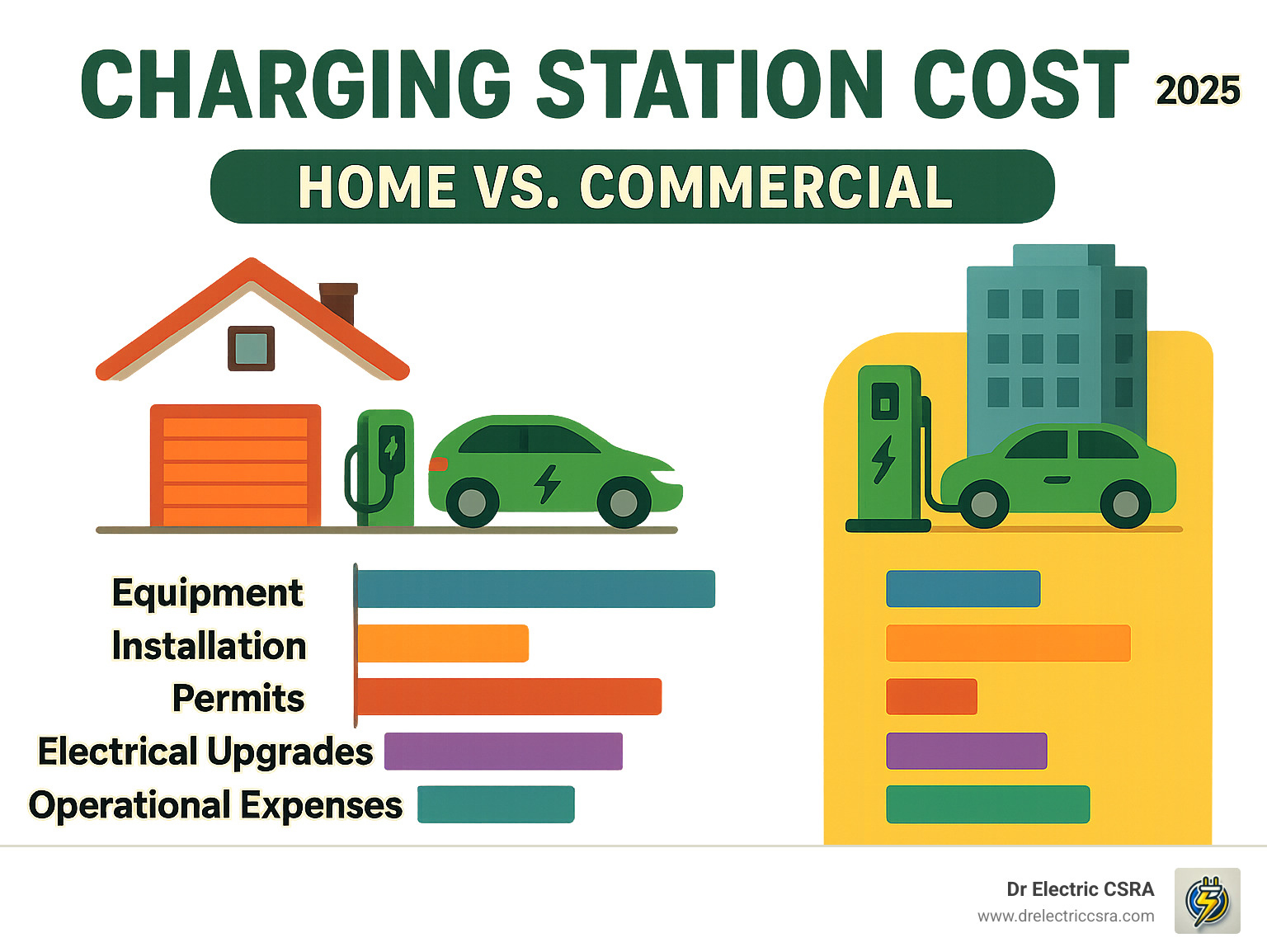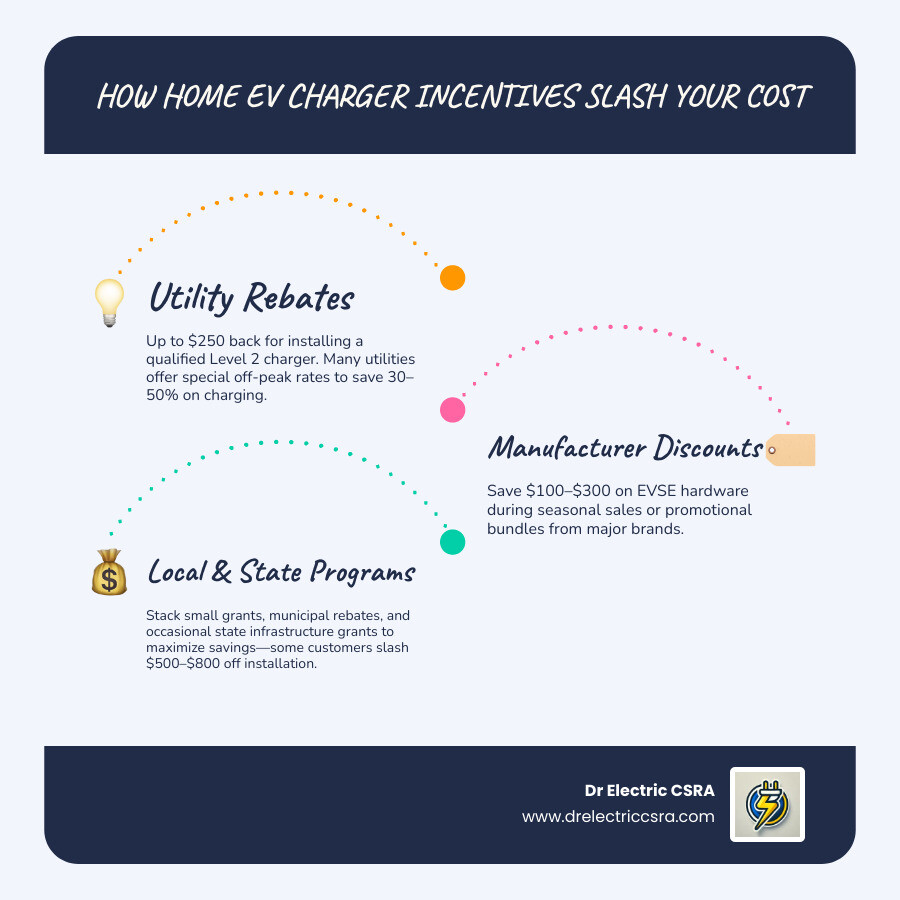Why Understanding EV Charging Station Costs Is Critical for Your Budget

Charging station cost varies dramatically based on your needs – from $0 for basic Level 1 home charging to over $150,000 for commercial DC fast chargers. Here’s what you need to know:
Quick Cost Breakdown:
- Level 1 (Home): $0-$500 (uses existing outlet)
- Level 2 (Home): $1,000-$2,500 (including installation)
- Level 2 (Commercial): $3,000-$20,000 per unit
- DC Fast Charging: $30,000-$150,000+ per unit
With EV sales jumping to 10% of new vehicle purchases in 2024, more homeowners and businesses are asking: What will this actually cost me?
Charging station cost depends on your charging speed needs, electrical upgrades, permits, and ongoing electricity rates. Most EV owners do 80% of their charging at home, where electricity averages 16.5 cents per kWh – roughly one-sixth the cost of gasoline.
I’m Jesse Burnett, Master Electrician and founder of Dr. Electric CSRA. I’ve installed dozens of EV charging systems across the Central Savannah River Area and learned that understanding all the variables upfront saves homeowners and businesses thousands in surprise expenses.

Charging station cost terms to remember:
EV Charging Levels & Their Typical Costs
Choosing the right charging level makes a huge difference in your charging station cost. Let me walk you through the three levels.
Level 1 charging uses any standard 120V outlet – the same outlet you’d plug a vacuum cleaner into. You’ll get about 2-5 miles of range for every hour of charging. The beauty of Level 1: it costs almost nothing to get started since you’re using existing wiring.
Level 2 charging uses 240V power – the same voltage that runs your clothes dryer. This delivers 20-40 miles of range per hour, charging your EV from empty to full in 3-8 hours. Level 2 requires a dedicated circuit and professional installation, which is when charging station cost starts adding up.
Level 3 (DC Fast Charging) can add 160-250 miles of range in just 30-60 minutes. These commercial units bypass your car’s built-in charger and pump DC power straight into the battery. They’re amazing for road trips but not practical for homes due to massive electrical requirements.
| Charging Level | Power Output | Charge Time (0-80%) | Equipment Cost | Installation Cost | Total Home Cost |
|---|---|---|---|---|---|
| Level 1 | 1.4-1.9 kW | 20+ hours | $0-$500 | $0-$300 | $0-$800 |
| Level 2 | 7-22 kW | 3-8 hours | $400-$2,000 | $600-$2,500 | $1,000-$4,500 |
| Level 3 | 50-350 kW | 30-60 minutes | $30,000-$150,000 | $20,000-$100,000 | Not practical for homes |
How Speed Impacts Your Budget
The faster you want to charge, the more you’ll pay upfront. Battery size makes a massive difference – a compact EV with a 40 kWh battery costs about $6.60 for a complete charge at Georgia’s average rate, while a big pickup with 130 kWh costs $21.45.
Range-per-hour varies between different EVs too. A Tesla Model 3 might gain 44 miles per hour on Level 2, while a Ford F-150 Lightning only gains 19 miles per hour on the same charger.
Battery longevity is often overlooked. Constantly using DC fast charging can wear batteries out faster than gentle Level 2 charging at home overnight.
The Real Charging Station Cost Equation for Homeowners
After installing dozens of systems across Augusta, Evans, and Martinez, I’ve learned that four main factors determine your final charging station cost.
Equipment prices start around $400 for basic Level 2 units. Smart chargers with Wi-Fi and scheduling run $800-$1,200. Premium models can hit $2,000, but most families don’t need all those features.
Labor costs in our area run $75-$125 per hour. A straightforward installation takes 2-4 hours, but complex jobs requiring long wire runs take 6-8 hours.
Panel upgrades are often the expensive surprise. Many homes built before 2000 have 100-amp panels that can’t safely handle an EV charger alongside existing loads. Upgrading to 200-amp service costs $1,500-$3,000.
Permitting in Richmond County runs $50-$150. Some municipalities require additional inspections adding $100-$200.
At Georgia’s average rate of 16.5 cents per kWh, driving 1,000 miles monthly costs about $55 in electricity versus $150+ for gasoline.
Typical installation costs: Basic setups using existing 240V outlets run $400-$800 total. Standard installations requiring new circuits cost $1,200-$2,200. Complex jobs needing panel upgrades range from $2,500-$4,500.
For more information, check out our More info about Residential Electrical and More info about Car Charger Installation services.
Charging Station Cost Scenarios: Basic Plug vs Smart Level 2
Sarah in Evans drives 30 miles daily. She bought a $300 portable Level 1 charger for her existing outlet – no installation needed. Her EV charges overnight perfectly for daily driving, though longer trips require planning.
Mike in Martinez drives 80 miles daily and wanted reliability. We installed a $1,200 smart Level 2 charger on a new 50-amp circuit for $2,400 total. His EV charges from 20% to 100% in 4 hours, and the smart features schedule charging during cheaper off-peak hours, saving $20 monthly.
Smart Level 2 advantages include load sharing to prevent panel overloading, scheduling for cheaper rates, and remote monitoring. These features add $200-$500 to equipment costs but often pay for themselves through optimized charging.
Incentives & Rebates That Slash Home Installation Bills
Georgia Power offers rebates up to $250 for residential EV chargers, plus special time-of-use rates charging just 1.3 cents per kWh during super off-peak hours (11 PM to 7 AM).
Equipment discounts happen regularly throughout the year. Manufacturers offer seasonal promotions saving $100-$300 on hardware.
Local programs occasionally provide additional savings. The City of Augusta has offered small grants for EV infrastructure.
Pro tip: Stack incentives whenever possible. We’ve helped customers combine utility rebates with manufacturer discounts to cut total charging station cost by $500-$800.

Commercial Charging Station Cost Drivers & ROI
Commercial charging station cost ranges from $500 to $150,000 depending on your installation. Basic Level 2 commercial units run $2,300-$6,500 per port. DC fast chargers cost $30,000-$150,000+ per unit.
Installation often exceeds equipment costs. That $3,000 Level 2 charger might need $12,700 worth of electrical work. Site preparation usually dominates budgets – trenching, concrete work, and parking lot restoration add up quickly.
Demand charges create ongoing surprises. DC fast chargers can add $1,000-$2,000 monthly to utility bills just from peak demand. Software and network fees run $250-$500 annually per port for payment processing and monitoring.
Maintenance budgets separate successful installations from broken equipment. Level 2 stations need $300-$500 yearly. DC fast chargers require $2,000-$5,000 annually plus reserves for major repairs.
Revenue models vary widely. Some offer free charging to attract customers. Others charge $0.25-$0.50 per kWh for Level 2 or $0.40-$0.60 per kWh for DC fast charging. Busy DC fast chargers generate $2,000-$5,000 monthly – enough to pay for themselves within 2-4 years.
For detailed analysis, see this Scientific research on non-residential EVSE costs.
Top Five Hidden Costs That Surprise Business Owners
Transformer upgrades top the list at $10,000-$50,000 per project. DC fast chargers often need dedicated transformers that can cost more than the charger itself.
ADA compliance adds $2,000-$8,000 for accessible parking, proper signage, and sometimes complete parking area regrading.
Signage and striping runs $1,500-$5,000 for professional parking lot work and required EV-only signs.
Data plans create ongoing expenses of $50-$100 monthly per charger for cellular connectivity.
Downtime losses hurt more than repairs. Popular DC fast chargers lose $500-$1,000 daily during extended outages.
Funding & Tax Credits for Commercial Sites
The 30% federal tax credit covers up to $100,000 per charging unit, including installation costs. NEVI grants provide up to 80% of project costs for interstate corridor locations.
Utility make-ready programs sometimes cover electrical infrastructure upgrades, saving $10,000-$50,000 on larger projects.
Stacking incentives creates the biggest wins. We’ve helped clients combine federal credits with utility rebates and state grants to cover 70-80% of total project costs.
Pay-Per-Use: What You’ll Pay at Public Chargers
Public charging station cost varies by pricing model. Per-kWh pricing charges $0.25-$0.60 per kilowatt-hour. Per-minute pricing charges $0.15-$0.75 per minute regardless of charging speed. Flat session fees add $2-$10 just for connecting. Idle fees charge $0.50-$1.00 per minute after charging completes.
In the Southeast, Level 2 public charging typically costs $1.00 per hour or $2.50 per session. DC fast charging averages $0.43-$0.48 per kWh, roughly $20 per hour of charging.
Free charging still exists at some Publix and Kroger locations, certain hotels, municipal buildings, and car dealerships.
Before traveling, check real-time pricing using the Electrify America app to avoid surprises.
Comparing Public vs Home Charging Costs
Home charging in Georgia costs 16.5 cents per kWh during standard hours, dropping to 8-12 cents during off-peak with time-of-use rates. For typical EVs getting 3.5 miles per kWh, that’s 4.7 cents per mile peak and 2.9 cents per mile off-peak.
DC fast charging at 45 cents per kWh costs about 12.9 cents per mile – nearly three times home rates. For 15,000 annual miles, home charging costs $210 yearly versus $1,935 for all public DC fast charging.
The sweet spot strategy: charge at home for daily driving, use public fast charging only for road trips.
For detailed comparison, see our Home EV Charger vs Public Charging guide.
How Network Choice Affects Your Wallet
Membership plans offer bulk pricing. Electrify America’s Pass+ costs $4 monthly for 25% off all sessions. EVgo subscriptions run $7-$15 monthly with reduced rates.
Reliability matters for trip planning. Tesla Boostrs maintain 95%+ uptime. Electrify America and EVgo stay 85-90% operational. Older networks can be more variable at 70-85%.
Choose one primary network with good coverage along your routes and pay for membership if you charge more than twice monthly.
Money-Saving Tips, Incentives & Best Practices
Smart planning can cut your charging station cost in half without compromising quality.
Load management prevents expensive panel upgrades. Smart chargers automatically pause EV charging when major appliances run, potentially saving $1,500-$3,000 in electrical work.
Smart scheduling uses Georgia Power’s time-of-use rates. Charging from 11 PM to 7 AM at 8.9 cents per kWh versus daytime rates can cut monthly bills by 40%.
Bundling electrical upgrades spreads permit and labor costs across multiple projects, saving $500-$1,000 when timing EV installation with other electrical work.
Future-proofing with conduit costs $200-$300 extra during installation but prevents expensive trenching later when adding capacity.
Equipment timing matters. Manufacturers run sales in spring and fall. Utility rebates must be applied for before installation starts.
Top money-saving moves:
- Install during new construction or renovations
- Choose locations within 50 feet of electrical panels
- Buy equipment during manufacturer sales
- Apply for utility rebates before installation
- Use programmable scheduling for off-peak charging
- Consider professional installation for safety and warranty protection
The biggest mistake? Skipping smart features or professional installation to save upfront costs. Smart scheduling and load management pay for themselves within the first year, while professional installation ensures safety and code compliance.
Frequently Asked Questions about Charging Station Costs
Why do DC Fast Chargers cost so much more than Level 2?
Level 2 chargers are like smart extension cords, while DC fast chargers are miniature power plants. DC fast chargers bypass your car’s charger, doing power conversion at 10-50 times the power level.
Inside DC fast chargers are massive transformers, cooling systems, and power electronics costing $30,000-$100,000 just for components. The electrical infrastructure needs three-phase, 480-volt power requiring new transformers and high-voltage wiring – often $50,000 before the charger arrives.
Will installing a home charger spike my electric bill?
Your bill will increase, but less than your gasoline savings. Most EV owners drive 12,000-15,000 miles yearly, using 3,400-4,300 kWh annually. At 16.5 cents per kWh, that’s $560-$710 yearly, or $47-$59 monthly.
With Georgia Power’s EV rate at 8.9 cents per kWh from 11 PM to 7 AM, annual costs drop to $300-$380. Compare this to $150-$200 monthly gasoline costs for significant savings.
Can commercial chargers really pay for themselves?
Absolutely, with proper location and strategy. Well-placed DC fast chargers generate $2,000-$5,000 monthly. Highway corridor chargers often pay for themselves in 3-5 years.
Many businesses use chargers to attract customers who spend money while charging – often more valuable than electricity revenue alone. Success depends on location, reliability, and managing demand charges properly.
Conclusion
Charging station cost doesn’t have to drain your wallet. Most homeowners find their sweet spot with a $1,200-$2,400 Level 2 installation that pays for itself within two years through gasoline savings.
Business owners can benefit from federal tax credits covering 30% of costs and various grant programs making commercial installations financially attractive.
At Dr. Electric CSRA, we’ve guided hundreds of customers through charging station cost decisions across Augusta, Evans, Grovetown, Martinez, Aiken, and North Augusta. Our philosophy: safety first, budget second, fancy features third. We believe in code-compliant installations that protect your investment.
Proper planning prevents expensive surprises. Quality equipment lasts longer. Professional installation means fewer headaches. Ongoing maintenance keeps everything running smoothly.
The best part? We’re helping people save money while supporting cleaner transportation. It’s rewarding to cut someone’s fuel costs in half while reducing their environmental impact.
Ready to explore EV charging costs for your situation? We offer free consultations with honest answers and no sales pressure.
For detailed installation information, visit our More info about Car Charger Installation page. We’d love to help you join the growing number of CSRA residents who charge at home and smile every time they pass a gas station.





0 Comments